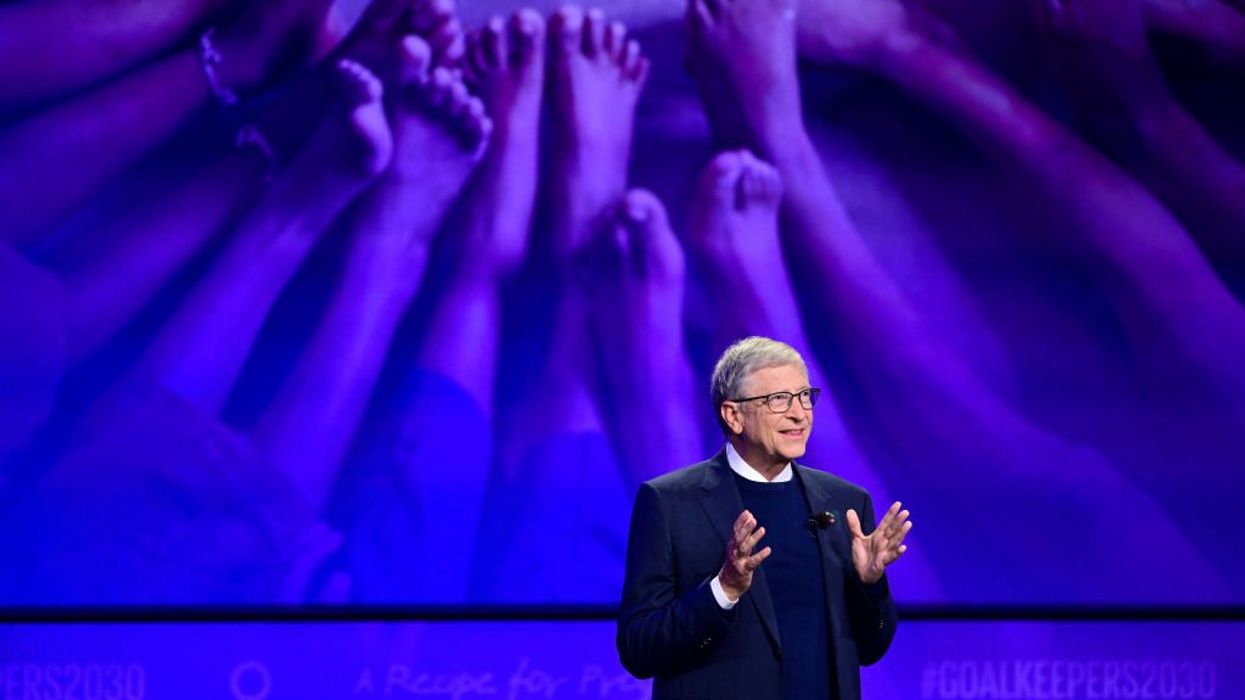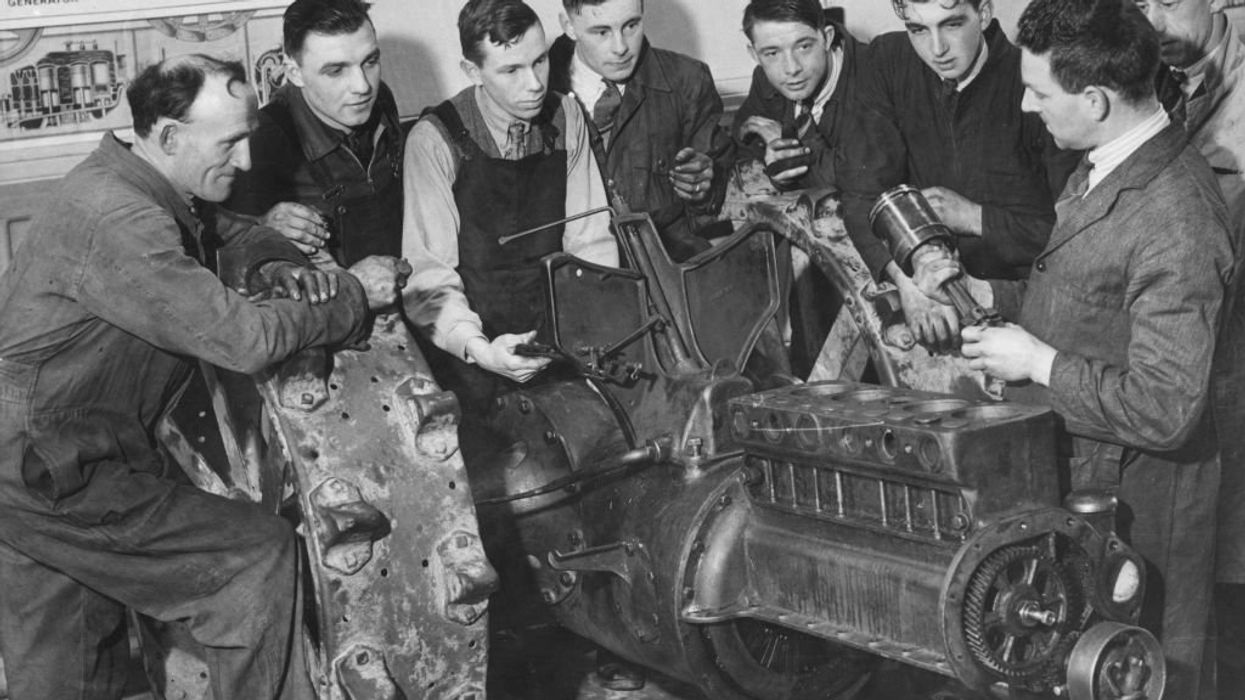Editor’s Note: This article is part of a larger series about lesser-known religions called “Understanding Faith.”
--
OUIDAH, Benin (TheBlaze/AP) -- The deified residents of the Temple of Pythons, when released to find food, sometimes slither across the road into a Catholic church that once hosted Pope Benedict XVI. The local priest, the snake handlers say, is always good enough to call or bring the gorging reptiles back to their own spiritual home.
This is life in Ouidah, a mecca of spirits and gods worshipped by practitioners of Voodoo, a recognized religion in this former French colony in West Africa that is home to 9 million people. The religion has its own pope -- or two, depending on who you ask -- whose reign dates back to the 1400s and can be seen about town in his SUV.
 Jean Zossoujbo, a guide at the Temple of Pythons, shows a python to a visitor to the temple in Ouidah, Benin, on Wednesday, Jan. 9, 2013. Ouidah, considered the major cultural city in the West African nation of Benin, is preparing for its annual Voodoo Festival on Thursday. (AP Photo/Sunday Alamba)
Jean Zossoujbo, a guide at the Temple of Pythons, shows a python to a visitor to the temple in Ouidah, Benin, on Wednesday, Jan. 9, 2013. Ouidah, considered the major cultural city in the West African nation of Benin, is preparing for its annual Voodoo Festival on Thursday. (AP Photo/Sunday Alamba)
This past Thursday, local banks and the post office closed as the town celebrated its annual Voodoo Festival, an event increasingly drawing curious foreigners. With its mix of beliefs and traditions, the Voodoo practiced here shows both a clash of cultures and the ability for ancient traditional beliefs to adapt to modern life.
While some Americans may hold Hollywood-inspired images of what Voodoo is, the description coming from those who embrace it -- and from others who have observed their practices -- paints a more complex picture.
"It is like we are sending all the evil in the country, on the continent, away," said Djabassi Manonwomin, a Voodoo priestess who leads others in the worship of a mermaid deity. "The people today are corrupt, we can see that. It is from the old days, but now more open.
"More people are hungry (for corruption). They put their bellies in front of themselves."
 A man raises a knife to a crowd of worshippers and onlookers before slaughtering a goat at the Temple of Pythons during the Voodoo Festival in Ouidah, Benin, on Thursday, Jan. 10, 2013. Ouidah, considered the major cultural city in the West African nation of Benin, held its annual Voodoo Festival on Thursday. Voodoo is an official religion in this nation of 9 million people and this year's festival honored the slaves taken from surrounding countries and sent into America and the Caribbean, people who brought the religion with them. Credit: AP
A man raises a knife to a crowd of worshippers and onlookers before slaughtering a goat at the Temple of Pythons during the Voodoo Festival in Ouidah, Benin, on Thursday, Jan. 10, 2013. Ouidah, considered the major cultural city in the West African nation of Benin, held its annual Voodoo Festival on Thursday. Voodoo is an official religion in this nation of 9 million people and this year's festival honored the slaves taken from surrounding countries and sent into America and the Caribbean, people who brought the religion with them. Credit: AP
Voodoo, also called "vodoun" here, can be seen throughout the streets of Ouidah. One local school proudly identifies itself by the religion. Down the dusty street on a recent day one could see the decapitated head of a monkey, wrapped around a stick, a curse someone had placed near a shrine of a three-head man wrapped by pythons. While the curse was grotesque, Voodoo generally does not follow the images from movies and novels from the West, of zombies and possessions.
It borrows heavily from the mythology of Yoruba people of Nigeria's southwest. Gods and spirits of neighboring Togo and nearby Ghana also can be openly worshipped -- and others much farther afield. At Manonwomin's own shrine, the walls bear images of the Hindu god Ganesh, as well as the image of an Indian woman praying. Outside, a small offering of bananas and biscuits, doused in perfume, could be seen by her gate outlined in chalk.
 Voodoo chiefs watch as a man slaughters a goat, not in frame, at the Temple of Pythons during the annual Voodoo Festival in Ouidah, Benin, on Thursday, Jan. 10, 2013. The deified residents of the Temple of Pythons, occasionally released to eat in this West African coastal city, sometimes slither across the road into a Catholic church that once hosted Pope Benedict. Credit: AP
Voodoo chiefs watch as a man slaughters a goat, not in frame, at the Temple of Pythons during the annual Voodoo Festival in Ouidah, Benin, on Thursday, Jan. 10, 2013. The deified residents of the Temple of Pythons, occasionally released to eat in this West African coastal city, sometimes slither across the road into a Catholic church that once hosted Pope Benedict. Credit: AP
The chanting prayers include cries of "Power! Power!" Similar chants can be heard in evangelical Christian churches across Nigeria, including pastors' repeatedly shouting that enemies should be consumed by "fire!"
Though Benin appears to be where slaves brought to America and the Caribbean learned about Voodoo, the nation itself has a mixed history with the religion. Mathieu Kerekou, a one-time Marxist dictator turned elected president, banned Voodoo practices during the Cold War. However, he himself was said to have been so angry about losing a popular election for the nation's highest office that he put a Voodoo curse on it himself.
Now, the religion has its own national day Jan. 10. It coexists peacefully with Islam and Catholicism, the other major religions in the country.
As men prepared to slaughter goats as an offering at a shrine, foreigners raised their own cameras up to catch the moment when worshippers slit the goat's throat. Others giggled or looked uncomfortable as they let guides at the python temple place the snakes around their shoulders or atop their head as a reptilian scarf.
 Aduare Achumba, a visitor to the Temple of Pythons, reacts as a guide puts a python on her head in Ouidah, Benin, on Wednesday, Jan. 9, 2013. Credit: AP
Aduare Achumba, a visitor to the Temple of Pythons, reacts as a guide puts a python on her head in Ouidah, Benin, on Wednesday, Jan. 9, 2013. Credit: AP
"You conjure up all kinds of images that Hollywood has sent us, but I did read up about it and learn that's not what it is," said Greg Fry, a tourist from Kamloops, Canada. "It made me interested to see how this functions, what part it plays in their society."
Material interests have entered the equation now as well. Peddlers selling African masks and other items surrounded those attending the festival. Daagbo Hanoun, the Voodoo pope, and his entourage also demanded payments from foreign journalists, despite their protests that the Vatican doesn't charge to cover Mass.
Some believe the fight over money launched a years-long insurrection by another man who claims he's the Voodoo pope by birth. That man celebrated his own Voodoo festival at a sports stadium in the city.

 Jean Zossoujbo, a guide at the Temple of Pythons, shows a python to a visitor to the temple in Ouidah, Benin, on Wednesday, Jan. 9, 2013. Ouidah, considered the major cultural city in the West African nation of Benin, is preparing for its annual Voodoo Festival on Thursday. (AP Photo/Sunday Alamba)
Jean Zossoujbo, a guide at the Temple of Pythons, shows a python to a visitor to the temple in Ouidah, Benin, on Wednesday, Jan. 9, 2013. Ouidah, considered the major cultural city in the West African nation of Benin, is preparing for its annual Voodoo Festival on Thursday. (AP Photo/Sunday Alamba)
 A man raises a knife to a crowd of worshippers and onlookers before slaughtering a goat at the Temple of Pythons during the Voodoo Festival in Ouidah, Benin, on Thursday, Jan. 10, 2013. Ouidah, considered the major cultural city in the West African nation of Benin, held its annual Voodoo Festival on Thursday. Voodoo is an official religion in this nation of 9 million people and this year's festival honored the slaves taken from surrounding countries and sent into America and the Caribbean, people who brought the religion with them. Credit: AP
A man raises a knife to a crowd of worshippers and onlookers before slaughtering a goat at the Temple of Pythons during the Voodoo Festival in Ouidah, Benin, on Thursday, Jan. 10, 2013. Ouidah, considered the major cultural city in the West African nation of Benin, held its annual Voodoo Festival on Thursday. Voodoo is an official religion in this nation of 9 million people and this year's festival honored the slaves taken from surrounding countries and sent into America and the Caribbean, people who brought the religion with them. Credit: AP
 Voodoo chiefs watch as a man slaughters a goat, not in frame, at the Temple of Pythons during the annual Voodoo Festival in Ouidah, Benin, on Thursday, Jan. 10, 2013. The deified residents of the Temple of Pythons, occasionally released to eat in this West African coastal city, sometimes slither across the road into a Catholic church that once hosted Pope Benedict. Credit: AP
Voodoo chiefs watch as a man slaughters a goat, not in frame, at the Temple of Pythons during the annual Voodoo Festival in Ouidah, Benin, on Thursday, Jan. 10, 2013. The deified residents of the Temple of Pythons, occasionally released to eat in this West African coastal city, sometimes slither across the road into a Catholic church that once hosted Pope Benedict. Credit: AP
 Aduare Achumba, a visitor to the Temple of Pythons, reacts as a guide puts a python on her head in Ouidah, Benin, on Wednesday, Jan. 9, 2013. Credit: AP
Aduare Achumba, a visitor to the Temple of Pythons, reacts as a guide puts a python on her head in Ouidah, Benin, on Wednesday, Jan. 9, 2013. Credit: AP


